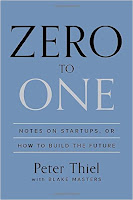The Guidelines
While there is no “formula” for creating disruptive technology (the author seems to not like this term even though it really is what we are talking about; he probably thinks it's overused), he offers some insightful guidelines into what makes a company that can leap from “zero to one”, as compared to, say, a new restaurant which has relatively little profit opportunity even for a similar amount of effort per person. These come straight from the book:
- The Engineering Question—Can you create breakthrough technology instead of incremental improvements?
- The Timing Question—Is now the right time to start your particular business?
- The Monopoly Question—Are you starting with a big share of a small market?
- The People Question—Do you have the right team?
- The Distribution Question—Do you have a way to not just create but deliver your product?
- The Durability Question—Will your market position be defensible 10 and 20 years into the future?
- The Secret Question—Have you identified a unique opportunity that others don’t see?
Thiel suggests that it takes all seven of these qualities to make the next Apple, Tesla, or PayPal, and even missing one of them can make for a dud. The examples of how not to follow these guidelines are well illustrated with his stories from the “green technology” bubble of the later 2000’s.
Contrasting With Lean
The thinking contrasts nicely with the incredibly popular The Lean Startup by Eric Ries which urges us to make incremental advances on an existing product, ship the “minimum viable product”, and iterate based on customer feedback. Thiel is in good company of big thinkers, and uses several examples from Apple who has created whole new industries, namely with iPod, iPhone, and iPad. After all, Steve Jobs has famously said “A lot of times, people don’t know what they want until you show it to them.” And Henry Ford said “If I had asked people what they wanted, they would have said faster horses.” (Well, it turns out Ford never actually said that, but it seems consistent with his actions.)
I’d say there is room for both the Lean Startup and Zero to One methodologies, because 1) they apply to completely different aspects of the product development process even if the ideas are easy to confound, and 2) different strategies will work for different companies, in different mixtures. If you are trying to build a hyperloop to revolutionize transportation, your approach will be very different than trying to capitalize on an app store fad to ship the next “Flappy Bird” clone. In-between are a myriad of unique situations.
Conclusion
Overall I liked the lessons in this book especially since they can work in parallel with lean methodologies if applied in the right way. With 140 pages of text, Thiel got his message across in half the words of the typical book, which I really appreciate. The back half was particularly valuable because that is where the suggested thought processes to move forward with were, compared to the history lessons at the beginning. Thiel ends with some very big-picture thinking, imploring us to take charge and build the future ourselves with some “definite optimism”, lest humanity end in collapse. Whether right or wrong, it’s good motivation!
What did you think of the book?
-Mike


No comments :
Post a Comment
If you're having trouble commenting with your google account, try enabling 3rd party cookies. In Safari, that means un-checking "prevent cross-site tracking" under privacy settings. Super annoying I know!